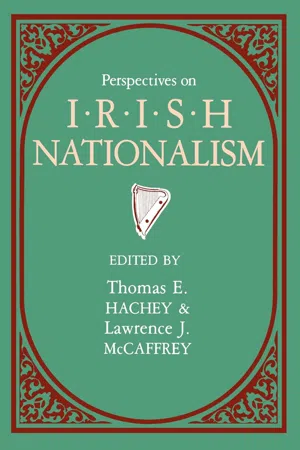
Perspectives On Irish Nationalism
- 172 pages
- English
- ePUB (mobile friendly)
- Available on iOS & Android
Perspectives On Irish Nationalism
About this book
Perspectives on Irish Nationalism examines the cultural, political, religious, economic, linguistic, folklore, and historical dimensions of the phenomenon of Irish nationalism. Its essayists are among the most distinguished Irish studies scholars. Their essays include a comprehensive analysis of the tapestry of Irish nationalism and focused studies that often challenge myths, pieties, and the scholarly consensus. Thomas E. Hachey is Professor of Irish, Irish-American, and British history and Chair of the department at Marquette University. He wrote Britain and Irish Separatism: From the Fenians to the Free State 1807-1922 (1977), coauthored and edited The Problem of Partition: Peril to World Peace (1972); coedited Voices of Revolution: Rebels and Rhetoric (1972), and edited Anglo-Vatican Relations, 1919-1937: Confidential Annual Reports of the British Ministers to the Holy See and Confidential Dispatches: Analyses of American by the British Ambassador, 1939-45 (1974). Lawrence J. McCaffrey is Professor of Irish and Irish-American History at Loyola University of Chicago. He has published a number of articles and books, including Daniel O'Connell and the Repeal Year (1966), The Irish Question, 1800-1922 (1968), The Irish Diaspora in America (1976) and coauthored The Irish in Chicago (1987). "
Frequently asked questions
- Essential is ideal for learners and professionals who enjoy exploring a wide range of subjects. Access the Essential Library with 800,000+ trusted titles and best-sellers across business, personal growth, and the humanities. Includes unlimited reading time and Standard Read Aloud voice.
- Complete: Perfect for advanced learners and researchers needing full, unrestricted access. Unlock 1.4M+ books across hundreds of subjects, including academic and specialized titles. The Complete Plan also includes advanced features like Premium Read Aloud and Research Assistant.
Please note we cannot support devices running on iOS 13 and Android 7 or earlier. Learn more about using the app.
Information
NOTES
Table of contents
- Cover
- Half title
- Title
- Copyright
- Contents
- Preface
- Components of Irish Nationalism
- Nation, Nationalism, and the Irish Language
- The Folklore of Irish Nationalism
- Nationalism: The Literary Tradition
- The Land Question in Nationalist Politics
- The Irish Political Tradition
- Irish Nationalism and the British Connection
- Notes
- Contributors
- Index